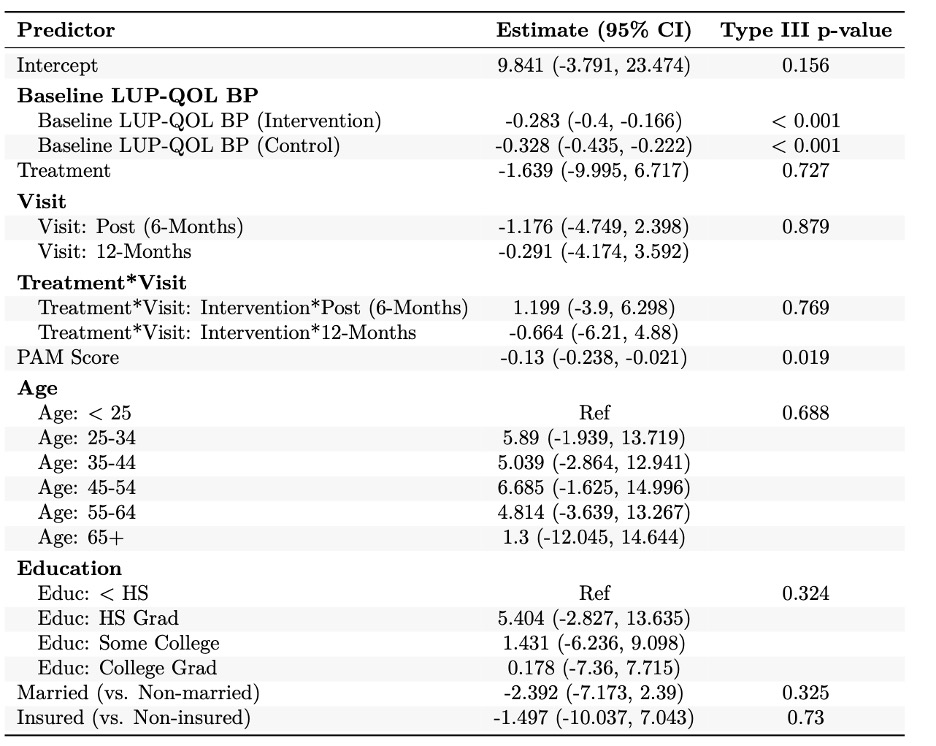Session Information
Date: Monday, October 27, 2025
Title: (1221–1247) Pain in Rheumatic Disease Including Fibromyalgia Poster
Session Type: Poster Session B
Session Time: 10:30AM-12:30PM
Background/Purpose: Peer mentoring has been shown to be an effective intervention for chronic conditions with evidence to suggest that it might improve health related bodily pain among African American women living with systemic lupus erythematosus (SLE). However, there is a lack of evidence to describe the intervention impact when adjusting for self-management of SLE. The present work aims to determine whether greater patient activation is associated with greater reductions in pain overall and within interventions groups.
Methods: We used a randomized controlled trial (RCT) design with experimental and social support control arms to test the peer approaches to lupus support (PALS) intervention (ClinicalTrials.gov # NCT03734055). Participants were recruited through the Medical University South Carolina (MUSC) P30 Core Center for Clinical Research and have validated diagnosis of SLE according to ACR classification criteria. Mentees (n=274) were randomized to either experimental arm or control arms. Participants in the experimental arm were paired with a peer mentor and received the full intervention condition (twelve 60-minute sessions across 24 weeks) covering self-management topics including: goal setting, effective communication, body image, and sexuality/sexual health. Those randomized into the control arm participated in a support group following the same bi-weekly session schedule but did not receive the tailored materials through a peer mentor. We measured pain and patient activation using the Lupus Quality of Life Questionnaire and Patient Activation Measure (PAM) respectively. Linear mixed models and multivariable models were fit to assess the intervention and impact of PAM on each predictor over time, respectively.
Results: The demographic characteristics of participants between experimental and social support control arms were generally comparable across age, education, marriage status, and insurance status. Our analysis includes 274 participants, evenly split between experimental and social support control arms. We did not observe statistically significant differences in pain over the study period between experimental and control groups (Table 1). However, across both groups, greater PAM score was associated with decreased pain (b=-0.13, p=0.019) (Table 2).
Conclusion: Those with higher PAM have reduced bodily pain. Additional work is needed to further typologize the varieties of pain experienced by people living with SLE, in addition to understanding the role of social relations and support. Specifically, additional mechanistic work is needed to understand the role of patient activation and to identify potential mediators and moderators of social support and pain among people living with SLE.
 Table 1: Summary of Fixed Effects
Table 1: Summary of Fixed Effects
.jpg) Table 2: Summary of Changes in LUP-QOL Bodily Pain Measures of Time by PAM Measure
Table 2: Summary of Changes in LUP-QOL Bodily Pain Measures of Time by PAM Measure
To cite this abstract in AMA style:
Leung J, Caldwell T, Nietert P, Dismuke C, Johnson H, Williams E, Keller E. Does Social Support Reduce Bodily Pain among African American Women with SLE?: Findings from a Randomized Controlled Trial [abstract]. Arthritis Rheumatol. 2025; 77 (suppl 9). https://acrabstracts.org/abstract/does-social-support-reduce-bodily-pain-among-african-american-women-with-sle-findings-from-a-randomized-controlled-trial/. Accessed .« Back to ACR Convergence 2025
ACR Meeting Abstracts - https://acrabstracts.org/abstract/does-social-support-reduce-bodily-pain-among-african-american-women-with-sle-findings-from-a-randomized-controlled-trial/
